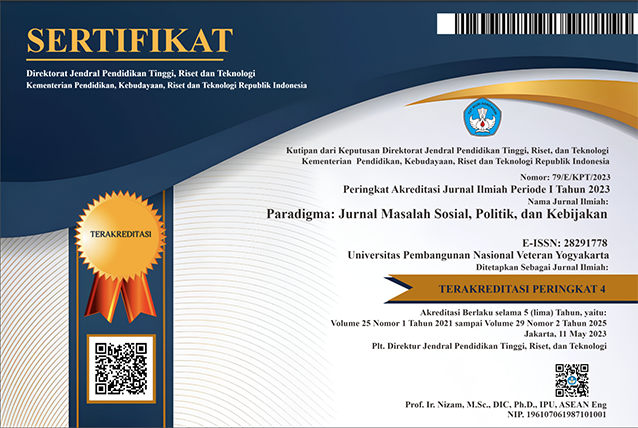The Role of Deliberative Democracy in Systemic-Structural Transformation for Sanitation Issues
DOI:
https://doi.org/10.31315/paradigma.v28i2.11593Keywords:
Access to clean water, Deliberative democracy, Sanitation, Systematic-Structural TransformationAbstract
This research explores the complex dimensions of sanitation issues, particularly focusing on the systematic structural transformation needed for long-term and resilient changes in achieving equitable access to clean water and sanitation. Utilizing a qualitative descriptive approach, the study draws insights from the case of West Java, exemplifying challenges arising from geographical conditions, industrial waste exposure, and limited public understanding. Emphasizing the importance of inclusive policies, the research underscores the significance of participatory deliberative democracy, as advocated by Jurgen Habermas, in addressing sanitation complexities. The findings reveal the necessity for a holistic and sustainable approach to sanitation policies, actively involving marginalized communities in decision-making processes. By examining successful grassroots initiatives and adopting a collaborative, affordable, and socially aware model, the study recommends a comprehensive strategy to integrate sanitation improvements into broader poverty alleviation and property security agendas. Ultimately, the research emphasizes the importance of societal collaboration, affordable solutions, and a nuanced understanding of socio-economic issues in addressing sanitation challenges in informal settlements.
References
Afifi, I. (2019). Jurgen Habermas; Senjakala Modernitas. IRCiSoD.
Anggara, S. (2014). E-Book: Kebijakan Publik, Bandung: CV. Pustaka Setia.
Aspinall, E., & Berenschot, W. (2019). Democracy for sale: Elections, clientelism, and the state
in Indonesia. Cornell University Press.
Bhatia, A., & Bhaskar, S. (2017, September 20). Kerala On Its Way To Go 100% Swachh: First
The State Tackled Open Defecation Effectively And Now It Aims To Go Waste Free | Swachh Report Card. Banega Swasth India. Retrieved May 30, 2023, from https://swachhindia.ndtv.com/kerala-way-go-100-swachh-first-state-tackled-open-defecation-effectively-now-aims-go-waste-free-12121/
BPLH Kabupaten Bandung. (2016). PEMERINTAH KABUPATEN BANDUNG PROVINSI JAWA
BARAT BUKU I RINGKASAN EKSEKUTIF INFORMASI KINERJA PENGELOLAAN LINGKUNGAN HIDUP DAERA. PPID Kab. Bandung. Retrieved May 27, 2023, from https://ppid.bandungkab.go.id/image/document/dinas-lingkungan-hidup-informasi-kinerja-pengelolaan-lingkungan-hidup-kabupaten-bandung-tahun-2016---buku-i.pdf
Chirawurah, D., Fishkin, J., Santuah, N., Siu, A., Bawah, A., & Kranjac-Berisavljevic, G. (2019).
Deliberation for development: Ghana’s first deliberative poll.
Dirgantara, A. (2019, June 21). Mengenal Masalah Sanitasi di Indonesia. Indonesia Environment
& Energy Center. Retrieved May 27, 2023, from https://environment-indonesia.com/mengenal-masalah-sanitasi-di-indonesia/
Dye, T. R., & Dye, T. R. (1992). Understanding public policy. Englewood Cliffs, NJ: Prentice
Hall.
Finlayson, J. G. (2005). Habermas: A very short introduction. OUP Oxford.
Fishkin, J. S., & Luskin, R. C. (2005). Experimenting with a democratic ideal: Deliberative polling
and public opinion. Acta politica, 40, 284-298.
Fouke, D. C. (2009). Democratic Deliberation and Moral Awareness. Journal of Deliberative
Democracy, 5(1), 10. https://doi.org/10.16997/jdd.79
Gimmler, A. (2001). Deliberative democracy, the public sphere and the internet. Philosophy &
Social Criticism, 27(4), 21-39.
Hartz-Karp, J., & Marinova, D. (2020). Using Deliberative Democracy for Better Urban Decision-
Making through Integrative Thinking. Urban Science, 5(1), 3. https://doi.org/10.3390/urbansci5010003
Husni, Muhammad, Amatul Jadidah, and Muhammad Hasyim. "MENINGKATKAN AKSES AIR
BERSIH DAN SANITASI BAGI PEREMPUAN MISKIN DESA: Perspektif Gender dalam Pengelolaan Sarana Air Bersih dan Sanitasi Berbasis Komunitas melalui Pendekatan Participatory Action Research di Desa Kademangan Kecamatan Pagelaran Kabupaten Malang." Jurnal Pusaka 4.2 (2017): 86-102
Katadata. (2021). Enam provinsi Jawa Paling Padat di Indonesia: Databoks. Pusat Data Ekonomi
dan Bisnis Indonesia. https://databoks.katadata.co.id/datapublish/2021/09/14/enam-provinsi-jawa-paling-padat-di-indonesia
Kementerian Kesehatan. (2022, March 22). Pemerintah Targetkan 2020-2024 Masyarakat
Indonesia Akses Air Minum Layak 100%. Sehat Negeriku. Retrieved May 27, 2023, from https://sehatnegeriku.kemkes.go.id/baca/rilis-media/20220322/5939554/pemerintah-targetkan-2020-2024-masyarakat-indonesia-akses-air-minum-layak-100/
Kementerian PUPR. (2022, September 10). Kementerian PUPR. Kementerian PUPR. Retrieved
May 30, 2023, from https://pu.go.id/berita/wujudkan-akses-air-minum-dan-sanitasi-aman-menteri-basuki-dorong-peran-aktif-semua-lapisan-masyarakat
Kemp, S. (2021, February 11). Digital in Indonesia: All the Statistics You Need in 2021 —
DataReportal – Global Digital Insights. DataReportal. Retrieved February 6, 2022, from https://datareportal.com/reports/digital-2021-indonesia
Kompas.com. (2022, March 8). Lima Provinsi dengan Tingkat Kelayakan Sanitasi dan Air Minum
Terendah Halaman all. Kompas.com. Retrieved May 27, 2023, from https://www.kompas.com/properti/read/2022/03/08/210000421/lima-provinsi-dengan-tingkat-kelayakan-sanitasi-dan-air-minum-terendah?page=all
McGranahan, G. (2013). Community-driven sanitation improvement in deprived urban
neighbourhoods: meeting the challenges of local collective action, co-production, affordability and a trans-sectoral approach. SHARE . https://doi.org/10.17037/pubs.01236350
McGranahan, G. (2015). Realizing the Right to Sanitation in Deprived Urban Communities:
Meeting the Challenges of Collective Action, Coproduction, Affordability, and Housing Tenure. World Development, 68(1), 242–253. https://doi.org/10.1016/j.worlddev.2014.12.008
Meier, B. M., Kayser, G. L., Kestenbaum, J. G., Amjad, U. Q., Dalcanale, F., & Bartram, J. (2014).
Translating the Human Right to Water and Sanitation into Public Policy Reform. Science and Engineering Ethics, 20(4), 833–848. https://doi.org/10.1007/s11948-013-9504-x
Muthhar, M. A. A. (2016). Membaca Demokrasi Deliberatif Jurgen Habermas dalam Dinamika
Politik Indonesia. Ushuluna, 2(2), 338519.
Naughton, C., & Mihelcic, J. R. (2017). Introduction to the importance of sanitation. Global Water
Pathogen Project, 10.
Network, R. A. (2015). What people say when they truly speak: Results from Ghana's first
deliberative poll. West Africa Resilience Innovation Lab, University for Development Studies, Tamale, Ghana.
Nuraeni, A., Nurasa, H., & Widianingsih, I. (2022). Implementasi Program Sanitasi Total Berbasis
Masyarakat Di Kota Bandung. Aliansi : Jurnal Politik, Keamanan dan Hubungan Internasional. http://jurnal.unpad.ac.id/aliansi/article/view/43201/18705
Participedia. (n.d.). Tamale deliberative poll (Ghana). Participedia.
https://participedia.net/case/4394?lang=en
Prasetyo, A. G. (2012). Menuju Demokrasi Rasional: Melacak Pemikiran Jürgen Habermas
tentang Ruang Publik. Jurnal Ilmu Sosial dan Ilmu Politik, 16(2), 169-185.
Ross, I., Cumming, O., Dreibelbis, R., Adriano, Z., Nala, R., & Greco, G. (2021). How does
sanitation influence people’s quality of life? Qualitative research in low-income areas of Maputo, Mozambique. Social Science & Medicine, 272(1), 113709. https://doi.org/10.1016/j.socscimed.2021.113709
Santoso, L. (2003). Seri Pemikiran Tokoh Epistemologi Kiri.
Susen, S. (2018). Jürgen Habermas: Between democratic deliberation and deliberative
democracy.
Swachh Bharat Mission. (2023, May 24). Swachh Bharat Mission - Gramin, Department of
Drinking Water and Sanitation. Retrieved May 30, 2023, from https://swachhbharatmission.gov.in/sbmcms/index.htm
Taufiqurrahman, D. R., Sos, S., & Si, M. (2014). Kebijakan Publik. Jakarta: Fakultas Ilmu Sosial
dan Ilmu Politik Universitas Moestopo Beragama (Pers).
TEMPO.CO. (2020, November 10). APJII: Pengguna Internet RI 196,7 Juta Orang atau 73,7
Persen Penduduk. Bisnis Tempo.com
Tinoco, M., Cortobius, M., Grajales, M. D., & Kjellén, M. (2014). Water Co-operation between
Cultures: Partnerships with Indigenous Peoples for Sustainable Water and Sanitation Services. Aquatic Procedia, 2(1), 55–62. https://doi.org/10.1016/j.aqpro.2014.07.009
UNICEF. (2022). Air, Sanitasi dan Kebersihan (WASH). UNICEF. Retrieved May 29, 2023, from
https://www.unicef.org/indonesia/id/air-sanitasi-dan-kebersihan-wash
Winkler, I. T. (2015). The human right to sanitation. U. Pa. J. Int'l L., 37, 1331.
World Health Organization. (2020). State of the world’s sanitation: an urgent call to transform
sanitation for better health, environments, economies and societies.
Zhu, Q., & Li, Y. (2014). Environmental Restoration in the Shiyang River Basin, China:
Conservation, Reallocation and More Efficient Use of Water. Aquatic Procedia, 2(1), 24–34. https://doi.org/10.1016/j.aqpro.2014.07.005
Downloads
Published
How to Cite
Issue
Section
License
The manuscript submitted to Paradigma: Jurnal Masalah Sosial, Politik, dan Kebijakan journals are released under the license of Creative Commons Attribution-Non Commercial- ShareAlike (CC BY SA) if and when the article is accepted for publication.
We declare that:
- This paper has not been published in the same form elsewhere.
- It will not be submitted anywhere else for publication prior to acceptance/rejection by this Journal.
- A copyright permission is obtained for materials published elsewhere and which require this permission for reproduction.
Retained Rights/Terms and Conditions
Authors retain all proprietary rights to the published works, such as (but not limited to) the following rights:
- Copyright and other proprietary rights relating to the article, such as patent rights,
- The right to use the substance of the article in own future works, including lectures and books,
- The right to reproduce the article for own purposes,
- The right to self-archive the article
The right to enter into separate, additional contractual arrangements for the non-exclusive distribution of the article's published version (e.g., post it to an institutional repository or publish it in a book), with an acknowledgment of its initial publication in this journal Paradigma: Jurnal Masalah Sosial, Politik, dan Kebijakan



